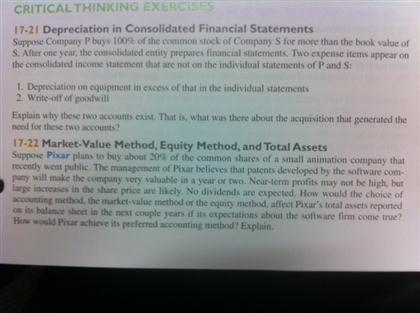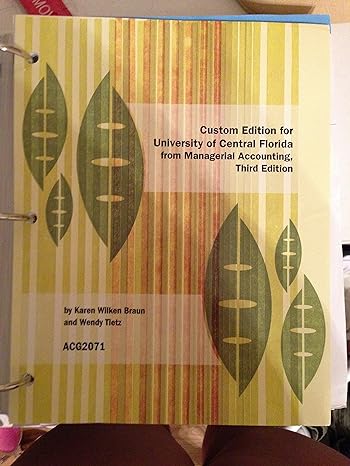
Depreciation in Consolidated Financial Statements Suppose Company P buys 100% of the common stock of Company S for more than the book value of S. After one year, the consolidated entity prepares financial statements. Two expense items appear on the consolidated income statement that are not on the individual statements of P and S: Depreciation on equipment in excess of that in the individual statements Write-off of goodwill Explain why these two accounts exist. That us, what was there about the acquisition that generated the need for these two accounts? Market-Value Method, Equity Method, and Total Assets Suppose Pixar plans to buy about 20 percentage of the common shares of a small animation company that recently went public. The management of Pixar believes that patents developed by the software company very valuable in a year or two. Near-term profits may not be high, but large increases in the share price are likely. No dividends are expected. How would the choice of accounting method, the market-value method or the equity method, affect Pixar's total assets reported on its balance sheet in the next couple years if its expectations about the software firm come true? How would Pixar achieve its preferred accounting method? Explain. Depreciation in Consolidated Financial Statements Suppose Company P buys 100% of the common stock of Company S for more than the book value of S. After one year, the consolidated entity prepares financial statements. Two expense items appear on the consolidated income statement that are not on the individual statements of P and S: Depreciation on equipment in excess of that in the individual statements Write-off of goodwill Explain why these two accounts exist. That us, what was there about the acquisition that generated the need for these two accounts? Market-Value Method, Equity Method, and Total Assets Suppose Pixar plans to buy about 20 percentage of the common shares of a small animation company that recently went public. The management of Pixar believes that patents developed by the software company very valuable in a year or two. Near-term profits may not be high, but large increases in the share price are likely. No dividends are expected. How would the choice of accounting method, the market-value method or the equity method, affect Pixar's total assets reported on its balance sheet in the next couple years if its expectations about the software firm come true? How would Pixar achieve its preferred accounting method? Explain







